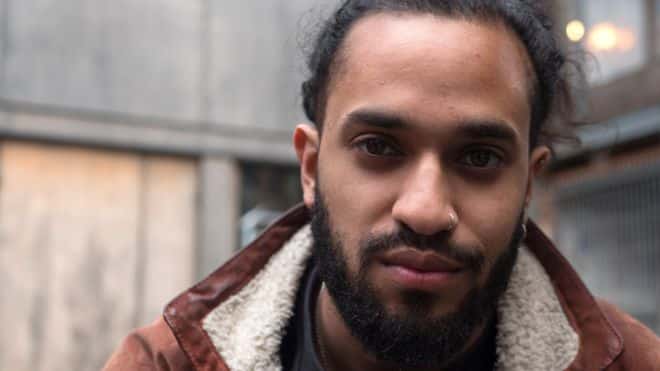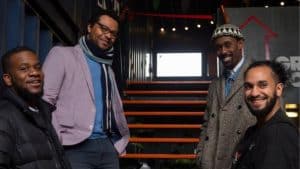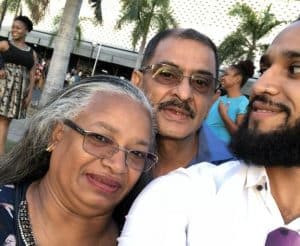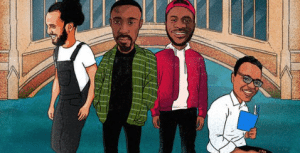
Bilal Harry Khan is fast becoming a leading voice on issues of social justice, race and masculinity.
In recent months, Bilal has featured in a number of BBC news and current affairs programmes and has launched a successful podcast with fellow Cambridge gra duates, all ‘black and mixed-race guys’, looking at life, diversity and the challenges faced after graduation. One recent episode of the podcast featured an interview with Stormzy, following the artist’s decision to sponsor scholarships at the university for black students.
duates, all ‘black and mixed-race guys’, looking at life, diversity and the challenges faced after graduation. One recent episode of the podcast featured an interview with Stormzy, following the artist’s decision to sponsor scholarships at the university for black students.
Bilal (OE 2003–2010), who turned freelance in August this year, works as a facilitator running diversity and inclusion training workshops with corporate clients. He visited the School this term to deliver a talk to Year 11 on Masculinity, identity and you.
Earlier in the year, Bilal was a panellist on BBC Radio 4’s Woman’s Hour, also speaking about masculinity.
He was interviewed on the BBC World Service about his mixed-race heritage in the run-up to the wedding of Prince Harry and Meghan Markle. The royal bride had spoken of her confusion as a child when asked to describe her race and of the enduring impact of her mixed-race background during her acting career.
Bilal told presenter Nora Kim of his own experiences as a person from a mixed-race background. His father is Kenyan of South Asian heritage and his mother is Jamaican from a mixed-race (East Asian and black Caribbean) heritage.
He recalled a time when he was out with some of his QE schoolmates: “Most of my friends were Asian. Someone’s girlfriend said ‘Oh, you are the black friend.’” This conversation caused him to reflect at the time that “my identity is based on how other people perceive me”.
 When used in the UK, the term ‘mixed-race’ is generally presumed to mean a combination of white and ‘something else’, he said, yet that did not describe him or many other people. “Perhaps we need to change the definition to include people like myself, like my mum,” he said.
When used in the UK, the term ‘mixed-race’ is generally presumed to mean a combination of white and ‘something else’, he said, yet that did not describe him or many other people. “Perhaps we need to change the definition to include people like myself, like my mum,” he said.
More recently, he has been interviewed by the BBC’s Global Gender & Identity Correspondent, Megha Mohan. In the website article, he related the challenges of living in the UK with a name that is unfamiliar to many – including one occasion when he visited a school (not QE) and a teacher introduced him in assembly as ‘Harry’ even though he had been repeatedly emailing the teacher and signing himself off as ‘Bilal’. The teacher later told him that ‘Bilal’ would have been “difficult” for the children, although in fact many of them had come up to him after his talk and said his name perfectly.
In his parting shot in the article, Bilal made a plea: “Children in the UK should be able to grow up loving and being proud of their names. You can play a part in that by learning to pronounce them properly. It is not that hard. If you can say ‘Tchaikovsky’, you can pronounce our names.”
His lecture to Year 11 this term, which was delivered together with Akash Vaghela (OE 2003-2010), had the overall title of Finding your passion, with Bilal focusing on Masculinity,  identity and you. His own passion, Bilal told the boys, was for “social equality and change, youth empowerment, equal opportunity”.
identity and you. His own passion, Bilal told the boys, was for “social equality and change, youth empowerment, equal opportunity”.
After leaving QE, Bilal read Theology at Cambridge. While there, he met the three friends with whom he launched the Over the Bridge podcast in March this year.
Since graduating, he has worked as a youth engagement officer in Barnet and then, for more than four years, for WE, a Toronto-based non-profit organisation working globally with young people and families.
